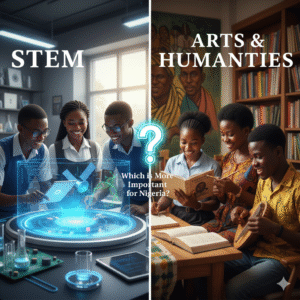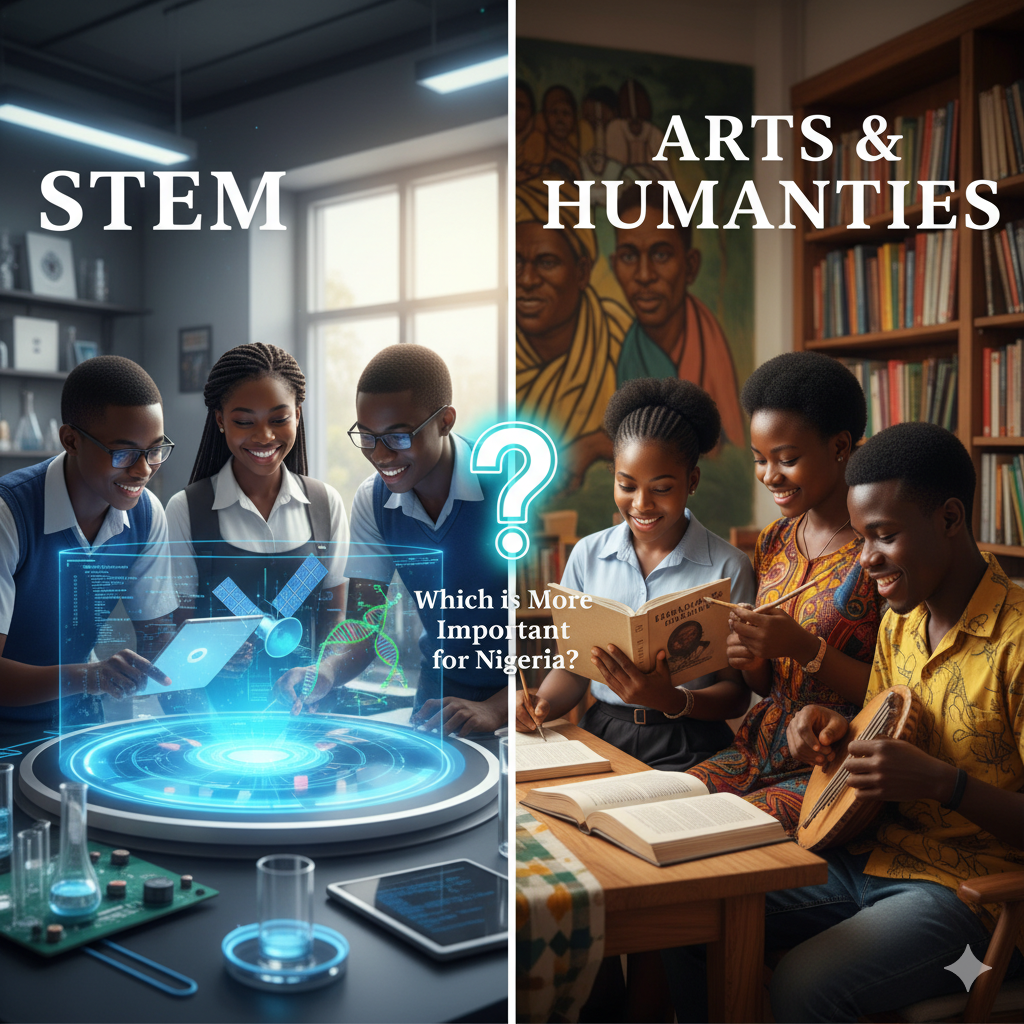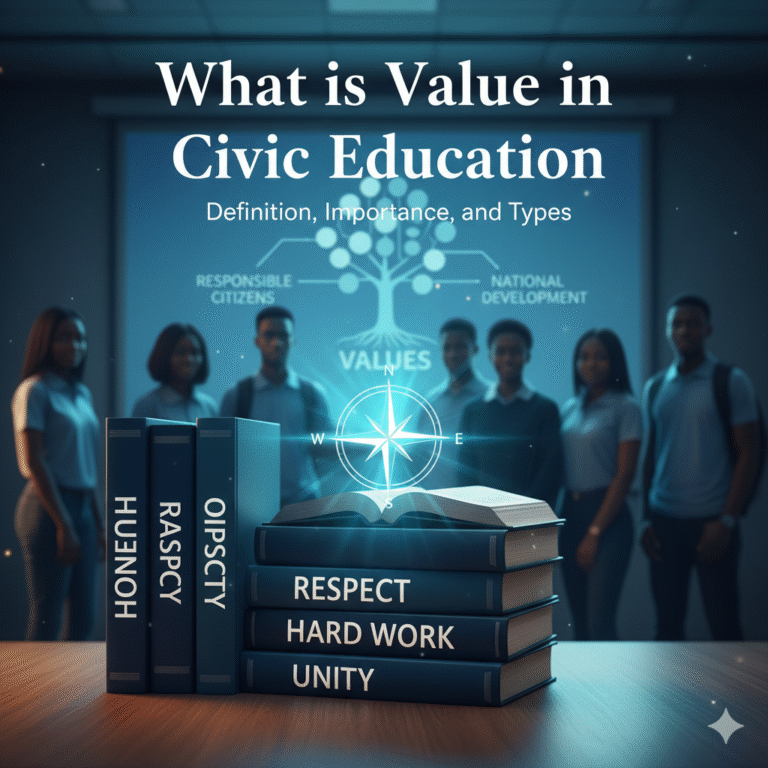Debate: Is STEM Education More Important Than Arts and Humanities in Nigeria? (7 Winning Points for the Motion)
Debate: Is STEM Education More Important Than Arts and Humanities in Nigeria? (7 Winning Points for the Motion)
Good day, students!
Looking for the winning points for your next debate? You’ve come to the right place. Today, we are tackling a big one. We are arguing for the motion that STEM education is more important than Arts and Humanities in Nigeria.
This isn’t just a school topic; it’s a real question about our country’s future.
First, let’s define our terms so everyone is on the same page.
- STEM stands for Science, Technology, Engineering, and Mathematics.
- Arts and Humanities are subjects like History, Literature, Fine Art, Music, Government, and Religious Studies.
A quick disclaimer: Before we jump in, let’s be 100% clear. This is an educational debate. We are not saying Arts subjects are useless—far from it! A country needs a soul, and the Arts provide that. But for this debate, our job is to prove why STEM is more important, especially for Nigeria right now.
Let’s get to the points.

7 Winning Debate Points on Why STEM is More Important
1. The Engine of Economic Growth
Good day, Mr. Chairman, panel of judges, accurate timekeeper, co-debaters, and fellow students.
My first and most important point is that STEM is the undisputed engine of Nigeria’s economic growth.
Think about it. What are the biggest and most valuable companies in the world right now? They are tech companies. Apple. Google. Microsoft. What are the industries that drive our own Nigerian economy? Oil and Gas (Engineering, Chemistry). Telecommunications (Technology). FinTech (Technology, Mathematics).
These industries don’t run on poetry. They run on code, on engineering, on chemical analysis. Arts and Humanities help us understand our culture, which is vital. But STEM is what builds the economy. The World Bank has emphasized that prioritizing STEM skills is essential for economic prosperity and for creating a competitive, modern nation. STEM creates wealth, and that wealth pays for everything else, including the Arts.
2. Solving Our Biggest Real-World Problems
My second point is about problem-solving.
Nigeria has big, practical challenges. We need food security. We need stable electricity. We need to manage floods. We need better healthcare.
When there is an outbreak of a disease, who do you call? A musician? A historian? No. You call doctors, virologists, and scientists to find a cure and create vaccines. When we need to power our cities, we don’t call a poet. We call electrical engineers. When we need to feed 200 million people, we need agricultural science.
These are all sustainable solutions that come directly from STEM fields. Arts can report on these problems. Arts can inspire us to fix them. But only STEM can actually build the solutions.
3. Creating a 21st-Century Skilled Workforce
My third point is that STEM education creates the skilled workforce our country desperately needs.
The job market has changed. The truth is, the high-demand careers of today and tomorrow are in technology. Data analysts, software developers, network engineers, biomedical engineers… these are the jobs that offer high employability skills and good salaries.
An Arts degree is valuable, but a STEM degree is in higher demand. We need to prepare Nigerian students for the jobs that exist and the jobs that will exist, not just the jobs of the past. This is about building our human capital formation. In fact, UNESCO highlights that STEM is key to drive innovation and sustainable development in Africa, which is exactly what Nigeria needs.
4. Driving National Development and Technological Advancement
My fourth point is simple: No nation can achieve true national development without technological advancement.
This is the core difference between a developed nation and a developing one. Look at countries like China, South Korea, and the USA. Their global power is built on their technological and industrial might. They invent, they build, they export technology.
If Nigeria is to move from being a “consumer” nation (that only buys) to a “producer” nation (that builds and sells), it will be STEM graduates leading the way. We can’t import our way to greatness. We must innovate our way there. And innovation is the child of Science and Technology.
5. Enhancing National Security
Let’s talk about something very serious: national security.
A modern nation defends itself not just with soldiers, but with technology. We need cybersecurity to protect our banks and government data from hackers. We need advanced engineering for our military. We need satellite technology for communication and intelligence.
These are not Arts-based fields. They are pure STEM. A strong nation must have a strong STEM base to protect its citizens and its sovereignty in the 21st century. It’s that simple.
6. Improving Everyday Quality of Life
My sixth point is about our daily lives. Every single thing that makes your life easier, safer, and healthier today is a product of STEM.
- The phone in your hand? Technology.
- The anti-malaria drugs you take? Science.
- The bridge you crossed to get to school? Engineering.
- The light bulb you use to read at night? Engineering.
- The mobile money app you use? Technology and Mathematics.
Arts and Humanities enrich our lives. They give us joy, music, and meaning. This is 100% true. But STEM sustains our lives. It provides the basic infrastructure and healthcare for a modern, healthy society.
7. The Argument of Urgency and Priority
Finally, my opponents will surely say, “Why not both? We need both!”
And they are right. In a perfect world, we would fund both equally.
But we do not live in a perfect world. We live in Nigeria, a developing nation with limited resources and urgent problems. This debate is not about “which is good” but about “which is more important.” It is a question of priority.
When we must choose where to put our limited funds, we must choose the fields that build the economy, solve our health crises, create jobs, and secure our future. We must prioritize STEM. It is a matter of urgent national priority.
Thank you.
Frequently Asked Questions (FAQs)
What’s the strongest argument for the other side (Arts)?
The strongest argument for the Arts is that they teach us how to be human. They teach critical thinking, empathy, ethics, and communication. They are the ‘soul’ of our culture. A nation of only engineers with no art, history, or literature would be a very dull and possibly dangerous place. This is a good point, but our argument is that you need the foundation (STEM) before you can properly support the ‘soul’.
But doesn’t STEM kill creativity?
Not at all! This is a huge myth. Think of the creativity it takes to design a beautiful, strong bridge (Engineering + Art), to write a complex piece of software (Technology), or to discover a new scientific theory (Science). Innovation is creativity. STEM simply channels that creativity into solving practical problems.
How do I conclude this debate?
A strong conclusion briefly restates your main theme. For example: “In conclusion, my opponents have argued well that the Arts enrich our souls. But our argument is that STEM education builds the very house we live in, provides the food we eat, and cures the diseases that plague us. For a Nigeria that wants economic growth, technological advancement, and a secure future, the priority is clear. We must invest in STEM. I urge you to support the motion.”
Conclusion / Summary
So there you have it! 7 powerful, winning points to argue that STEM education is more important than Arts and Humanities in Nigeria.
Final Disclaimer: Please remember, the goal of this debate template is to help you win an educational argument. In the real world, Nigeria needs both excellent artists and lawyers, and brilliant scientists and doctors. Every field has value. We are simply providing the strongest script for this side of the motion.
What do you think? Is stem education more important than arts and humanities in nigeria? Drop your own points or opinions in the comments section below! And don’t forget to share this post with your debate team.
This video discusses the shocking economic growth in Nigeria, a topic directly related to the debate points about STEM’s role in driving the economy. World Bank Celebrates Nigeria’s Shocking Economic Growth








❣️❣️❣️❣️❣️♥️🌹NICE!!